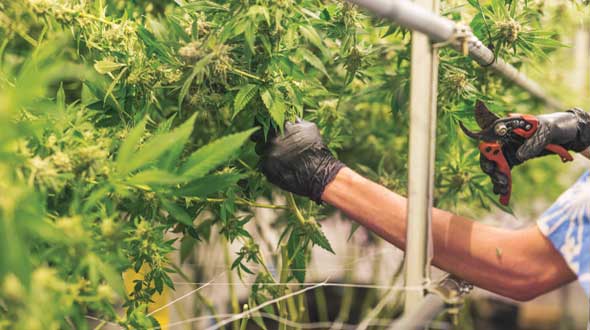Hemp market positioned to offer growth opportunities for propane

Propane can be used to dry hemp crops or heat the greenhouses where some producers choose to grow the plants. Photo: FatCamera/E+/Getty Images
The National Propane Gas Association (NPGA) hosted a webinar, “Hemp and the propane industry: What you need to know,” to educate industry members on potential propane usage for hemp farming.
Twana Aiken, manager of regulatory affairs at NPGA, shared research on the growing hemp market and the opportunities it presents for propane retailers.
Cannabis derivatives
According to Aiken, the 2014 Farm Bill was the first act of legislation that allowed for hemp cultivation. After the 2018 Farm Bill passed, industrial hemp became legal at the federal level and was considered an “agricultural commodity,” Aiken explains.
There are two types of cannabis, says Aiken: cannabis indica and cannabis sativa L.
Cannabis sativa L., which is known as industrial hemp, contains 0.3 percent or less of THC, more cannabidiol (CBD) and does not have the same chemical effects as THC.
Cannabis indica, more commonly known as marijuana, has a higher concentration of THC and causes the intoxication effect associated with recreational marijuana.
Hemp is also harvested for fiber seed oil and used in a variety of products, from cosmetics and lotion to socks and fabric.
Propane usage in hemp farming
One of propane’s main opportunities to integrate into the hemp market is through crop drying.
A 100,000 Btu propane heater can dry anywhere from 750 to 1,000 bushels of hemp in a 24- to 48-hour period, according to Aiken. The crop’s initial planting date typically takes place between mid-May and early June, and it is harvested in early October.
Another way propane can penetrate the market is by heating greenhouses. While there are traditional farms for hemp growing, many farmers opt for growing the crop in greenhouses to control and maintain consistent temperatures. Propane marketers have an opportunity to service those greenhouses for heating purposes.
Propane can also be used in the extraction process to retrieve CBD oil from the hemp plant, which is a non-psychoactive component of hemp, Aiken says.
Rules and regulations
The U.S. Department of Agriculture (USDA) is the main agency that oversees hemp production.
As of July, 25 states have USDA-approved hemp production programs, Aiken says. The Occupational Safety and Health Administration holds hemp processors to general industry standards regarding hazard communications, lockout/tagout, respiratory protection, powered industrial trucks and machine guarding.
Currently, state governments require hemp farmers and processors to obtain a license, which varies by state, Aiken says.
Aiken says that propane retailers are not required by law to verify a hemp farmer’s license, but she suggests that retailers confirm with them that the operation they are interested in servicing is legitimate.
Retailers’ concerns
According to Aiken, propane technicians are not at risk of THC exposure by servicing a hemp field.
“USDA regulations ensure that any hemp over 0.3 percent THC must be destroyed,” she says. “For propane technicians to be exposed to THC in hemp plants, it would have to be heated or activated through other chemical means. So if there was THC in hemp, and if that THC got into your skin or was inhaled, it would not cause risk because it is not activated.”
She also notes that THC exposure during the crop drying process by way of inhalation or skin exposure is not a concern, research suggests. Retailers who still have concerns could wear an N95 mask.
“For propane marketers who are delivering fuel, no additional or special type of personal protective equipment is required beyond what is normally required,” Aiken says.
















